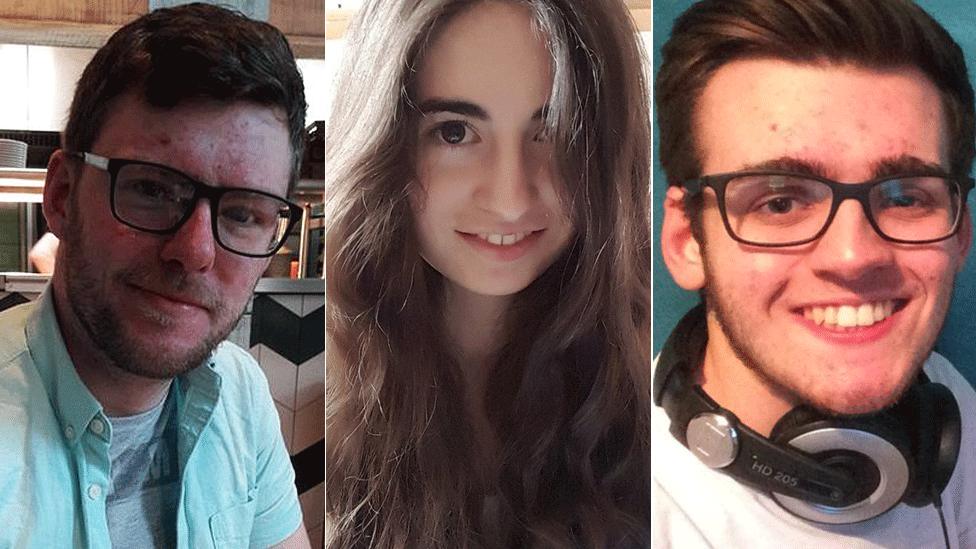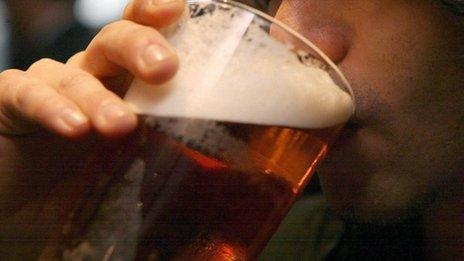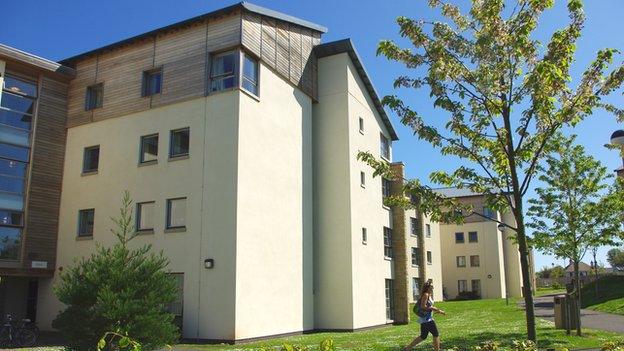Sober students look for alcohol-free halls at university
- Published

For many students, drinking and parties are a big part of the freshers' experience. But with more than one in five students saying they are teetotal, the demand for alcohol-free accommodation is on the rise.
Mohamed is 19 and about to start his second year at Aberdeen University.
He describes himself as talkative and easy to get along with.
His only concern when starting university? He doesn't drink.
As a Muslim he is teetotal for religious reasons so he opted for alcohol-free halls of residence.
"I would have felt uncomfortable living in a place where people were drinking. I didn't want to be in that environment," he says.
But far from being a boring place to be, he says he loved living there.
"I could still meet lots of people and get involved in activities".
"Some of my friends went straight into private accommodation and they missed out on stuff because they were living further away from the campus."
The alcohol-free block at Aberdeen University was relatively small when it was introduced last year and the 30 rooms available were only half full.
But at other universities the idea has proved more popular.
More than 400 students applied for alcohol-free accommodation at St Andrews University last year - far exceeding the 132 rooms available.
Other universities which now offer booze-free living options include Chester, Bristol, Canterbury Christ Church and the University of West England.

Aberdeen student Lachlan Shanks says he wanted to avoid booze-fuelled parties in his flat
The rise in accommodation options comes as a growing number of young people are choosing not to drink, external.
More than a fifth say they are teetotal, with financial pressures, a wider diversity of faiths and increased health awareness thought to be contributing factors.
Mohamed says: "There were quite a few people who did drink but only in moderation. A couple of my flatmates still went to parties and clubs. I think they were mainly worried about being in a noisy flat."
Lachlan Shanks, 19, also chose the alcohol-free block at Aberdeen University.
He prefers not to drink himself and says he is a quiet person.
"If I had flatmates that liked drinking and clubbing I wouldn't have had much in common with them," he says.
"I thought if I picked the alcohol-free block people wouldn't be coming home late or having parties in the flat."
Nearly four in five students surveyed by the National Union of Students (79%) still believe that getting drunk is part of university culture - and only one in 10 are aware of responsible drinking activities or campaigns on campus.
'I felt lonely as a non-drinker'

Lauren Seward says she spent a lot of time on her own during freshers week because she didn't drink.
Lauren Seward, 22, is teetotal and says she would "definitely" have considered alcohol-free accommodation if the option had been available.
She graduated from the University of Kent in 2017 and lived in halls in her first year but often felt lonely because so many activities revolved around drinking.
"Freshers' week was the worst because at that point everyone is really obsessed about going out and drinking so I spent a lot of time on my own," she says.
Although she eventually made friends outside her halls she said an alcohol-free option would have been appealing.
"On the one hand it's good to meet different people and plenty of my friends drink. But in first year it would give some reassurance that at least at home you won't have to deal with people drinking all the time."
Eva Crossan Jory, vice president for welfare for the NUS says if students are asking for these sorts of spaces, universities should offer them as an option.
"We also need to foster more responsible drinking cultures amongst students and offer more events and activities which aren't centred on drinking that everyone can enjoy."
'Being teetotal wasn't an issue'
But Georgia, 19, who is also teetotal, says she didn't want to live somewhere that marked her out as different.
Her university, Plymouth Marjon, didn't have an alcohol-free option so she lived in ordinary halls in her first year.
Although initially quite nervous about being around big groups drinking and worries about feeling left out, she soon made friends and found not drinking "wasn't an issue".
"I feel like if I'd been in alcohol-free halls I would have been judged by other students when I told them where I lived and subject to more scrutiny about 'why don't you drink?'.
"It could work for some people but I wouldn't want to be labelled like that," she says.
Mohamed says he didn't find this a problem.
"It wasn't segregated at all. I don't think that many people actually knew there was an alcohol-free block in my halls. I had friends living in other halls and other blocks. The only difference is there isn't alcohol in your own flat," he says.
- Published19 July 2018

- Published22 June 2018

- Published13 February 2015

- Published10 February 2015
